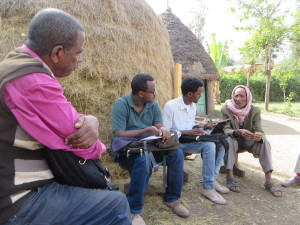ESSP Working Paper 86, by Andrew M. Simons.
Abstract: Centralized implementation mandates of Ethiopia’s Productive Safety Net Program (PSNP) require a full and uniform payment to each person in an eligible household. In practice, however, communities do not receive enough funding to fully implement the program. Therefore, communities must exercise local discretion in allocating aid. We recover the preferences revealed by local communities’ aid allocations and find they are propoor, allocating more to underprivileged groups with lower wage earning potential (e.g., teenage girls vs. teenage boys, adult women vs. adult men, elderly vs. working age adults). Despite communities’ pro-poor implementation, the program with constrained funding does not significantly lower overall poverty rates. In simulations with full funding, the program reduces poverty in both cases of centralized and decentralized program control, using different criteria for the allocation of funds. The major policy implication is that the financial scale of the safety net program is more important to poverty reduction than the locus of control over implementation. Download the PDF.
